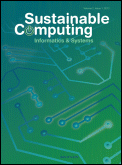
Sustainable Computing-Informatics & Systems
Scope & Guideline
Elevating eco-consciousness in information systems.
Introduction
Aims and Scopes
- Sustainable Computing Practices:
The journal emphasizes research on sustainable computing practices that minimize energy consumption and carbon footprint across various computing environments, including cloud computing, mobile computing, and IoT. - Energy Efficiency Optimization:
A core focus is on optimizing energy usage in computing systems through innovative algorithms, machine learning techniques, and metaheuristic approaches to enhance performance while reducing energy demands. - Green Cloud Computing:
Research topics include strategies for green cloud computing, addressing challenges around resource allocation, task scheduling, and energy management in data centers. - Smart Systems Integration:
The journal explores the integration of smart technologies, such as IoT and AI, in sustainable systems, aiming to improve efficiency and reduce environmental impact in sectors like agriculture, healthcare, and urban management. - Renewable Energy Utilization:
It promotes research on the utilization of renewable energy sources in computing systems, including energy management frameworks for smart grids and renewable-powered data centers.
Trending and Emerging
- AI and Machine Learning for Sustainability:
There is a significant increase in research that utilizes AI and machine learning to optimize energy efficiency and sustainability across various applications, indicating a trend towards intelligent systems. - Blockchain Technology in Energy Management:
Emerging themes include the application of blockchain technology for secure and efficient energy management systems, particularly in smart grids and decentralized energy resources. - Smart Agriculture and Environmental Monitoring:
Research focusing on smart agriculture practices and environmental monitoring using IoT and machine learning has surged, reflecting a growing interest in sustainable farming and resource management. - Multi-Agent Systems for Resource Optimization:
The use of multi-agent systems for optimizing resource allocation and energy management in complex environments is increasingly prominent, showcasing a shift towards decentralized and collaborative approaches. - Resilience in Computing Systems:
Emerging studies are addressing the resilience and reliability of computing systems under dynamic conditions, indicating a growing recognition of the need for robust solutions in sustainability.
Declining or Waning
- Traditional Resource Management Techniques:
Research focusing on conventional resource management techniques without integrating modern optimization strategies or AI is becoming less prevalent, as newer methodologies gain prominence. - Static Energy Consumption Models:
There is a noticeable decline in studies centered around static models for energy consumption, as the field moves towards dynamic and adaptive models that better reflect real-world scenarios. - General Surveys on Sustainable Practices:
Generalized survey papers that do not contribute new insights or methodologies are being published less frequently, indicating a shift towards more innovative and applied research.
Similar Journals
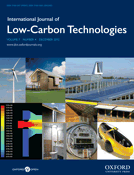
International Journal of Low-Carbon Technologies
Exploring cutting-edge solutions for a low-carbon world.International Journal of Low-Carbon Technologies is a premier, peer-reviewed publication dedicated to advancing the field of low-carbon technologies and sustainable practices. Published by OXFORD UNIVERSITY PRESS, this journal serves as a vital resource for researchers, professionals, and students alike, providing insightful research and innovative solutions for a sustainable future. With its ISSN 1748-1317 and E-ISSN 1748-1325, the journal is recognized globally, boasting an impressive impact in its categories, including a Q1 ranking in Architecture and Q2 rankings in both Civil and Structural Engineering and Environmental Science as of 2023. It is open access since 2014, facilitating the dissemination of knowledge to a wider audience, and encourages critical discourse on environmental sustainability across converging disciplines. The journal’s Scopus rankings reflecting its standing—ranked #23 in Architecture (88th percentile) and #130 in Civil and Structural Engineering—underscore its importance in driving forward the scientific agenda in low-carbon technologies. As we journey from 2007 towards 2024, the International Journal of Low-Carbon Technologies remains a cornerstone for research and dialogue in reducing carbon footprints and promoting resilient infrastructure.
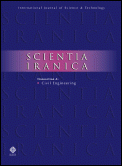
Scientia Iranica
Connecting scholars with cutting-edge discoveries.Scientia Iranica is a multidisciplinary journal published by SHARIF UNIVERSITY OF TECHNOLOGY, serving as a vital platform for researchers and professionals in the fields of Chemistry, Civil and Structural Engineering, Computer Science, Engineering, Industrial and Manufacturing Engineering, Materials Science, Mechanical Engineering, and Physics and Astronomy. Established in 1999 and converging until 2024, the journal has swiftly ascended in the academic realm, achieving a commendable status with several Q3 classifications across a variety of disciplines and a Q2 in Engineering (miscellaneous) in its 2023 quartile rankings. With its notable Scopus Ranks reflecting a consistent percentile presence in several categories, Scientia Iranica emphasizes rigorous peer-reviewed research and cutting-edge findings, thereby contributing substantially to the advancement of knowledge in its areas of focus. Although not available as open access, the journal remains essential, offering critical insights and fostering collaboration among scholars in Iran and globally, thus enhancing the visibility and impact of innovative research outcomes.

Cluster Computing-The Journal of Networks Software Tools and Applications
Empowering Knowledge in Cluster and Network SolutionsCluster Computing - The Journal of Networks Software Tools and Applications, published by Springer, is a premier academic journal catering to the vibrant fields of computer networks and software technologies. With an impressive impact factor and recognized as a Q1 journal in both Computer Networks and Communications and Software categories for 2023, it ranks within the top echelons of its field, boasting a Scopus rank of #50 out of 395 and #59 out of 407 respectively, highlighting its influence and reach. The journal, which has been in continuous publication since 2005, serves as a vital platform for groundbreaking research, offering insightful articles and tools that drive innovation in network computing. Researchers, professionals, and students are invited to contribute to and benefit from the dynamic discourse presented in this journal, which is pivotal for advancing knowledge and enhancing practical applications in a rapidly evolving technological landscape.

Frontiers in Energy Research
Driving the dialogue on energy sustainability and technology.Frontiers in Energy Research is a prestigious open-access journal published by FRONTIERS MEDIA SA, dedicated to advancing knowledge in the diverse fields of energy research. Launched in 2013, the journal has established itself as a pivotal platform for disseminating high-quality research, particularly in areas such as Economics and Econometrics, Energy Engineering and Power Technology, and Renewable Energy, Sustainability and the Environment. With a notable impact factor and impressive quartile rankings, including Q2 in multiple categories and a reputation for rigorous peer review, Frontiers in Energy Research offers researchers, professionals, and students alike a vital resource for exploring the latest innovations and insights in energy studies. Operating from its base in Lausanne, Switzerland, this journal is committed to enhancing open accessibility to relevant research, significantly contributing to the global dialogue on energy solutions and sustainability.
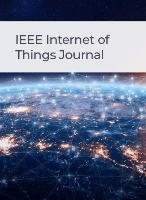
IEEE Internet of Things Journal
Pioneering Research in Connected SystemsWelcome to the IEEE Internet of Things Journal, a leading publication in the field of connected systems and smart technologies. Published by the IEEE - Institute of Electrical and Electronics Engineers Inc, this journal is dedicated to disseminating cutting-edge research and innovative developments in the Internet of Things (IoT) domain. With an impressive impact factor and recognized as a Q1 journal across multiple categories such as Computer Networks and Communications, Information Systems, and Signal Processing, the IEEE Internet of Things Journal serves as an essential resource for researchers, industry professionals, and students looking to advance their knowledge and contribute to this rapidly evolving field. Since its inception in 2014, the journal has steadily risen to prominence, ranking impressively in Scopus metrics with top positions in key categories, ensuring high visibility and credibility in the academic community. We invite you to explore the rich array of articles and access options available to support your research endeavors in one of the most transformative areas of technology today.
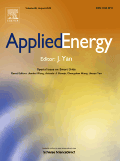
APPLIED ENERGY
Driving impactful research for a sustainable energy landscape.APPLIED ENERGY, published by Elsevier Science Ltd, is a leading journal dedicated to the advancing field of energy research, focusing on practical engineering solutions to contemporary challenges in energy management, sustainability, and environmental impact. With a rigorous peer-review process and a strong commitment to promoting innovative research, APPLIED ENERGY proudly holds multiple Q1 rankings across various categories, including Building and Construction, Civil and Structural Engineering, and Renewable Energy, reflecting its prestigious position within the academic community. Researchers and professionals can benefit from its comprehensive scope, covering topics that span from policy and technology to market dynamics. Although it is not an open-access journal, it provides access options that facilitate research dissemination. With its historical significance since 1975 and an ambitious outlook up to 2025, APPLIED ENERGY continues to be an essential resource for anyone looking to stay at the forefront of energy research and application.

Wireless Power Transfer
Exploring New Frontiers in Wireless Power TechnologiesWireless Power Transfer is a pioneering journal dedicated to the exploration and advancement of innovative technologies in the realm of wireless power transfer systems. Published by HINDAWI LTD, this esteemed journal has been a significant contributor to the fields of Computer Networks and Communications, Electrical and Electronic Engineering, and Energy Engineering and Power Technology since its inception in 2014. With an emphasis on promoting high-quality research and knowledge exchange, the journal aims to support the rapid development of wireless power solutions that meet modern energy demands. Although it currently holds a Q4 ranking in its respective categories, it is positioned to become a crucial platform for researchers and practitioners eager to address the challenges of efficiency and effectiveness in wireless energy transfer. Readers will benefit from open access content, enriching their understanding through the latest findings and methodologies. The journal is physically located in the United Kingdom, at ADAM HOUSE, 3RD FLR, 1 FITZROY SQ, LONDON W1T 5HF, ENGLAND, and welcomes submissions that provide insights into the future of this dynamic and evolving sector.
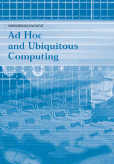
International Journal of Ad Hoc and Ubiquitous Computing
Innovating Today for a Connected TomorrowThe International Journal of Ad Hoc and Ubiquitous Computing, published by InderScience Enterprises Ltd, is a premier platform dedicated to advancing the fields of computer networks, communication systems, hardware, and software architecture. Since its inception in 2005, this journal has served as a critical resource for researchers, professionals, and students aiming to explore the intricate dynamics of ubiquitous computing and ad hoc networks. Though currently not an open-access journal, its scholarly contributions are well-recognized, as evidenced by its rank in the Scopus database, which places it within the lower quartiles of its respective categories. With an increasing focus on innovative solutions in computer science, the journal aims to facilitate knowledge dissemination and encourage interdisciplinary collaborations. Researchers are particularly drawn to the journal for its comprehensive coverage of emerging technologies, making it an invaluable asset in a world increasingly reliant on sophisticated communication infrastructures. As it continues to thrive towards 2024, the journal remains committed to fostering a vibrant academic community.

Journal of Grid Computing
Fostering Excellence in Grid Computing ResearchThe Journal of Grid Computing, published by Springer, stands as a pivotal resource in the dynamic field of computer science, particularly within the realms of Computer Networks and Communications, Hardware and Architecture, Information Systems, and Software. With an impressive Q1 ranking across these categories in 2023, the journal exemplifies excellence and rigor, catering to a diverse readership from researchers to industry professionals. Established in 2003, this esteemed journal is anchored in the Netherlands and releases cutting-edge research that reflects trends and advancements in grid computing technologies. Researchers can gain insights through its vast contributions, while institutions benefit from its prestigious standing within the SCOPUS framework, boasting high percentile ranks in multiple computer science categories. Though not open access, the journal provides unparalleled access options for institutional subscribers, solidifying its importance as a gateway to innovative discoveries in high-performance distributed computing.
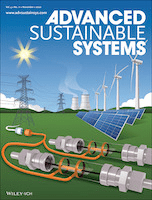
Advanced Sustainable Systems
Exploring Solutions for a Greener PlanetAdvanced Sustainable Systems is a premier academic journal published by WILEY-V C H VERLAG GMBH, dedicated to the dynamic fields of environmental science and renewable energy. With an ISSN of 2366-7486, this journal has rapidly established its significance within the scientific community, achieving a prestigious Q1 ranking in both Environmental Science (miscellaneous) and Renewable Energy, Sustainability and the Environment categories as of 2023. Spanning the converged years from 2017 to 2024, it serves as a vital platform for researchers and practitioners alike, facilitating the dissemination of innovative ideas and groundbreaking research that drive sustainability initiatives globally. Although not an Open Access publication, its contributions are invaluable, reflected by its commendable Scopus rankings—#28 out of 233 in General Environmental Science and #49 out of 270 in Renewable Energy. As we face pressing environmental challenges, Advanced Sustainable Systems remains at the forefront, championing research that informs and influences sustainable practices and policies across the globe.